-
Posts
28 -
Joined
-
Last visited
Content Type
Profiles
Forums
Events
Blogs
Gallery
Store
Posts posted by modernshaman
-
-
I have grafted 1 of each cross I had and had a crest with TPM x N1 however I lost it to black rot. The other crosses have yet to go crazy but look amazing so far. I have a little of each mutant with TPQC x TPM (monstrose, crested, monstrose/crest, regular columnar, and one that is completely unorganized)
These are all TPQC x TPM
This was a small section from one of the two first photos. It looked like a Trichocereus santiaguensis mostruosa or T. bridgesii crest that was spineless at first. I removed it as it was a bottom section that didn't seem to be growing unlike the columnar sections. I believed it would have reverted or just not have grown but continues to grow similar to a bridgesii crest IMO.
-
 14
14
-
-
Stenocereus pruinosus... there is a cactus ID section
-
2,4-D has been used by some in tissue culture to induce mutations. Its relatively easy to get access to it as it's sold as a herbicide.
-
Sounds like it was successful. Firm and greener are good signs theres a good connection.
-
Toothpick has mold on it
-
The longer you keep them in high humidity the slower you need to acclimate them to the lower humidity. I keep seedlings in high humidity 2 months, 3 max, than just completely remove the dome at once. The pros of keeping the seedlings in high humidity for a longer time is that the seedlings grow quicker and don't need to be watered as often. The cons of high humidity is longer time (week to a month) to acclimate them (not a really big issue), the seedlings are plump (with time you can undo this), and the seedlings are weaker (since you gave them ideal conditions they were baby'd).
I must admit that I abuse most of my seedlings getting near full sun at 3 months old. The seedlings are seriously stunted however growth comes quickly once they get use to the high sunlight.
I agree with Spine Collector that the orange is likely high humidity.
@ Spine Collector - if you sterilize your soil and the pots are clean you can leave the ziplock closed the entire time since the soil will not die out. HOWEVER if you open the bag you shouldn't keep it closed for long periods since you have allowed mold and bacteria to enter. I air out my seedlings every day or two like you however I use a dome.
-
I would love to have some.
-
There are two things that I've noticed that makes or breaks areola grafts are pressure and amount of exposed flesh on the scion (areola). I use a screen stretched over the trichocereus very tight and cut the areola flat so that the skin surrounds the entire areola. The more flesh exposed the more it dries out/shrinks making the graft fail. Your tbm graft looks like it will succeed. The validus graft has a chance of success assuming there is high pressure.
Why don't you use a faster stock like mutant suggested it will cut down the pupping time by weeks even months.
-
Pereskiopsis makes the areola pup the fastest however its possible to graft to any of those cacti. I would choose pereskiopsis first than opt for opuntia as a second selection. You can also use trichocereus sp. however they take longer to pup. Any fast growing cacti would be a good choice.
I'm not so sure how rare saguaro seeds are in Australia however they are plentiful here in the US. What is rare are mature specimens (branching) since they take so long to grow. I would graft seedlings over areolas since it's easier. If I'm not mistaken it takes 50 years for the first branch to start.
-
 2
2
-
-
Those look like 'sun/heat burn' that lots of Trichocereus get. It happens when the cactus suddenly gets high sunlight after a cloudy day or in your case very intense sunlight. The marks will not go away and are permanent however as your cactus grows it will be less noticeable. If they haven't already they may start oozing and than it will callous. (some in the pictures seem to have already calloused)
I don't think its black rot like Spine Collector had (notice his doesn't look like a boil/pimple like yours)
-
Here's an update on the graft. With 2 pereskiopsis the scion seems to be able to handle the extra growth. The scion is much thicker and the areolas are further apart. The scion is 7.5 cm long and around 4.5 cm wide.
I'll be attempting a lopho on 2 pereskiopsis to see if the lopho can handle it this weekend. In around a month, just a guess, I'll attempt a peruvian on 4 pereskiopsis.
I'm still thinking of a better way of possibly adding more pereskiopsis after the flat graft.
-
 7
7
-
-
It may be root rot however when this happened to mine a while ago and it was from too much sun. The excess sun caused bleaching I guess.
Is it soft? If not I wouldn't worry much.
-
I believe that hybrids are different than cultivars but Im unsure. I think your right that this is done by nurseries as a form of trademarking/recognition. I think it just becomes accepted once that clone becomes recognized or as the cactus clone spreads physically. I would think that an organization would only be needed to record/document it in cases of reporting and naming a new species... again I could be completely wrong.
http://www.cactus-art.biz/note-book/Dictionary/Dictionary_C/dictionary_cultivar.htm
-
 1
1
-
-
The hybrid would be the name of the two cacti combined with an X in the beginning to show its a hybrid.
Look at the "X Ferobergia"
Heres a wiki on it http://en.wikipedia.org/wiki/Hybrid_%28biology%29#Examples_of_plant_hybrids
-
 1
1
-
-
Yes sometimes the graft takes a while to start growing but in my limited experience they make up for the delayed growth with explosive growth.
-
 2
2
-
-
I've noticed this with grafts using pereskiopsis larger than 15 cm. I think its a result of too much 'energy' causing it to pup.
-
Yes pupping from every areola is common when grafted on pereskiopsis. After a little more growth it will stop pupping. This has happened to almost ALL of my trichocereus grafts.
You should remove the pups and graft onto other pereskiopsis if possible. The pups on my grafts just stop and all the growth goes to the main head however they may slowly 'steal' some energy and slow down overall growth.
-
 1
1
-
-
Thanks I'll try to find it myself, please post if you find it. I did find a thread mentioning using a drill bit to side graft pereskiopsis so perhaps that may work thought it wasn't tested.
I'm sure there is some sort of limit but the excessive pupping is usually only in the beginning of the growth and tends to stop. I have grafted onto a four foot pereskiopisis that was grown in full sun and the lopho grew rapidly. In the beginning there was overpupping like with most of my grafts however it seems to have died down as the scion 'adapts' to the excessive nutrients.
Yea I've also noticed that full sun grow thick pereskiopsis are strong growers. I tend to graft with pereskiopsis that are 15-20 cm long.
This is still a new idea to me so any links or info you have would be great.
-
 1
1
-
-
A seedling grafted onto a single pereskiopsis has its growth accelerated 5-10 times compared to on its own roots. Though this growth is temporary and the stock is not a permanent solution this accelerated growth is sought after. Now imagine if you could even further accelerate the growth by adding multiple pereskiopsis stock.
I've had this idea for a while now and have attempted it before but failed due to a lack of grafting experience. I've searched the web and have found a few references to this idea however haven't found a picture of a successful attempt or the results; I'm sure one exists.
The original idea is to do this by using the flat graft. However there is a limitation to this technique, the diameter of the vascular ring. If the scion isn't wide enough it limits the amount of pereskiopsis that maybe used to accelerate the growth. This concept should work with ANY stock however with large stock like a trichocereus you would be EXTREMELY limited to perhaps 4 stocks if they were modified for the rings to be in closer proximity. ONLY the flat graft would would with larger stocks.
Recently I've successfully grafted a Juuls Giant x LumberJack onto two pereskiopsis that were united by a side cut and some string. This graft is only a week old so I'm unsure of the amount of increased growth it has, if any, but 1 thing I can comment on is that since removing it from high humidity it has had daily growth shown by the apex spine growth. I'll be using a lopho as the scion in a few weeks once its large enough. This was the main goal of mine so I could attain faster flowering.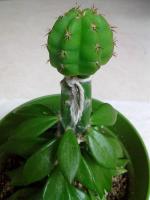
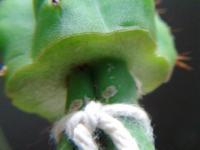

Now the reason for posting this is so others can test and find a better way of grafting multiple pereskiopsis without the limiting factor of the vascular ring's diameter. If you'll be attempting or have attempted something please post any fall backs and possible improvements to the technique.
A possibility I've thought of is getting a drill bit the size of the pereskiopsis and drilling slightly upward through the sides of the stock to the core than sharpening a pereskiopsis like a pencil and impaling the stock. This would be done AFTER performing the original flat graft with multiple pereskiopsis. The additional pereskiopsis would be "side stocks" added to surpass the restriction of the vascular ring.-
 9
9
-
-
Congrats you got yourself a flower bud.
-
 4
4
-
-
Stillman those are some nice grafts... The multihead is likely from the pereskiopsis pushing such rapid growth... I have a lopho that is pupping like crazy.
Here is my Astrophytum Super Kabuto Crest from seed
It is now all cut up and only the main(top) head is left on the pereskiopsis. I attempted 4 separate grafts; 2 on pereskiopsis and 2 on larger stock.
-
 3
3
-
-
Trichocereus spachianus
-
 4
4
-
-
That's pretty cool... Hopefully it continues to grow that way and ends up looking similar to the 'Fukurokuryuzinboku'/Breast Cactus. I've seen a bridgesii grow similar to it ONCE on an auction site however it was overpriced so I didn't get it.
-
 1
1
-
-
ferting the stock easily splits the scion, mind you
Have you personally experienced this? I've also read this but never seen proof.
I am currently testing this and have not had a problem with splitting so far. Perhaps this is only an issue if the grafts are not getting enough light or are dormant? I'm testing this with a large amount time-release fertilizer 19-6-12 NPK and the grafts are in full sun. I'm still only a month and a half in so this may change and I could have splits.
im not sure how long to wait to water after grafting, but certainly well after the graft is established I would assume...
Depending on the way you grafted you can water even before the graft has taken. Using the cling wrap or tying the scion with lots of pressure keeps the scion in place so watering is not an issue however I try to only water after I've seen that the stock has calloused over. In my climate it usually takes a week for the graft to take and callous.


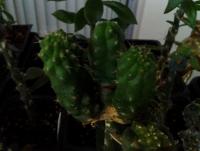

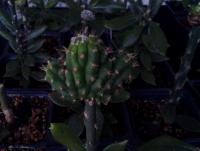
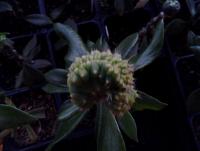
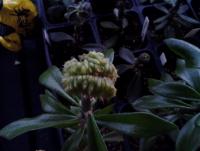


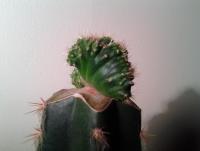
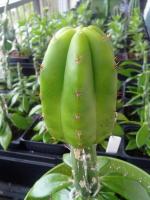
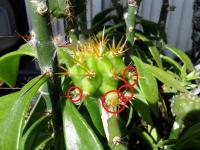
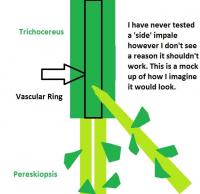

If a loph self-pollinates, will seeds give clones?
in Cacti & Succulents
Posted · Edited by modernshaman
No the seeds would be slightly different genetically from that mother. They will be very similar however wouldn't be a clone since the DNA would be different.